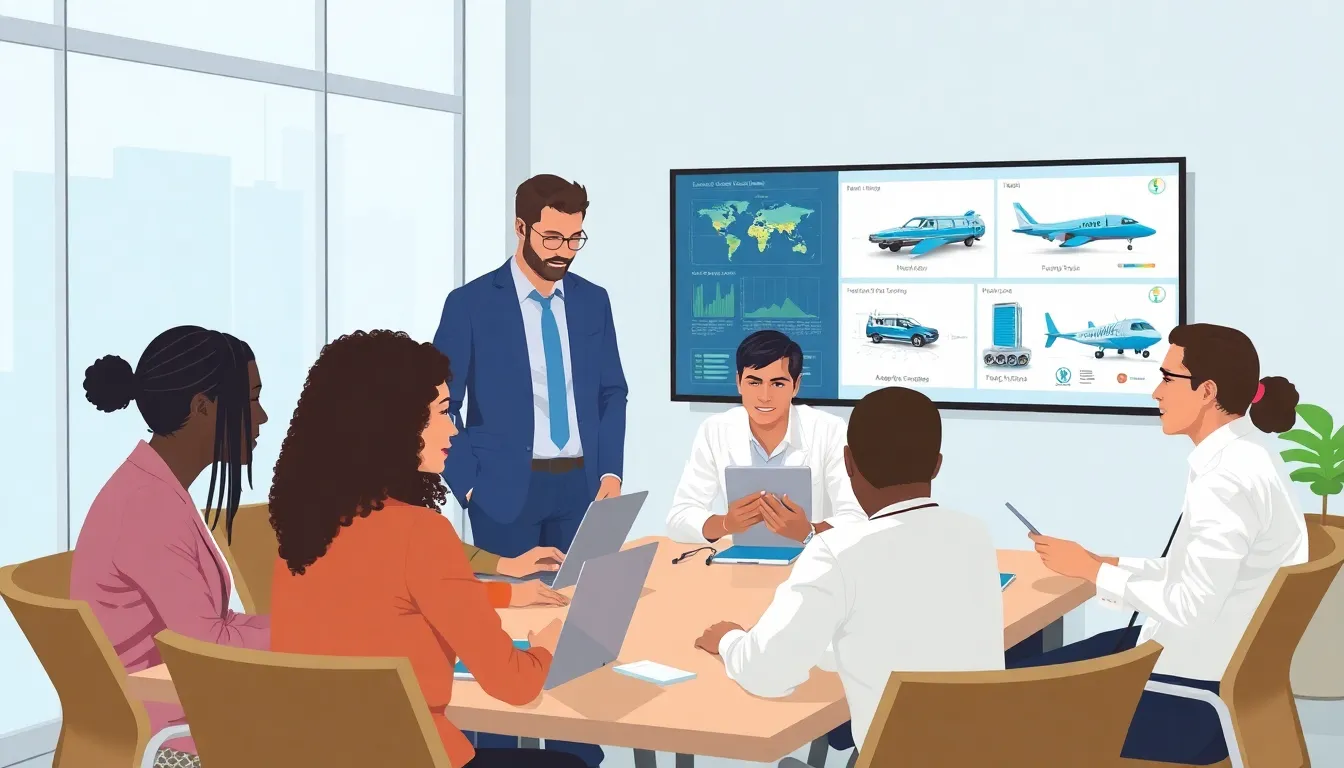In a world where smartphones have become extensions of our arms and smart fridges can tell us when we’re out of milk, high-tech innovations are reshaping everyday life. These advancements aren’t just for tech geeks anymore; they’re for anyone who enjoys a sprinkle of convenience with a dash of excitement. Imagine a future where your coffee brews itself while you’re still dreaming about that second slice of cake.
Table of Contents
ToggleOverview of High-Tech Innovations
High-tech innovations reshape daily lives significantly. Innovations like smartphones enhance communication efficiency. Smart appliances improve household management by offering automation. For example, a smart fridge can monitor inventory and suggest recipes. Technologies such as smart thermostats optimize energy usage in homes, contributing to sustainability.
Wearable devices track health metrics, providing users with real-time data. Many people utilize fitness trackers to monitor exercise and vital signs. Technologies assist in setting personalized health goals. Self-driving cars represent revolutionary advancements, redefining transportation safety. Their integration into urban settings promises reduced traffic congestion.
Artificial intelligence drives breakthroughs in various fields. AI systems analyze data quickly and offer insights that improve decision-making. In healthcare, AI aids diagnostics, helping practitioners detect conditions earlier. Machine learning algorithms adapt based on user interactions, enhancing user experience across platforms.
Augmented reality provides immersive experiences in gaming and education. Users interact with virtual elements seamlessly, engaging with content differently. Virtual reality transports users to alternate environments, enabling new ways to learn and explore. These technological advancements change how people engage with information and entertainment.
Blockchain technology secures transactions, ensuring data integrity. Its applications extend beyond finance, impacting supply chain management and voting systems. Innovations in quantum computing promise unparalleled processing power, potentially transforming industries.
High-tech innovations continue to advance rapidly, improving quality of life and efficiency across various sectors. They make technology accessible, catering to diverse consumer needs and preferences. As developments occur, these innovations will shape the future landscape, influencing how society functions on multiple levels.
Key Sectors Impacted by High-Tech Innovations

High-tech innovations significantly transform various sectors, driving efficiency and improving overall quality of life.
Healthcare
Healthcare technology advances rapidly, enhancing patient outcomes and reducing costs. Telemedicine facilitates remote consultations, enabling patients to access medical professionals from their homes. Wearable devices, such as smartwatches, track vital signs in real-time, promoting proactive health management. Machine learning algorithms assist in diagnosing diseases earlier, increasing treatment success rates. Robotics aid in surgeries with precision, minimizing recovery times for patients. These innovations contribute to personalized treatments tailored to individual needs.
Transportation
Transportation sectors undergo transformation through high-tech innovations that enhance safety and efficiency. Self-driving vehicles integrate sophisticated sensors and AI systems, aiming to reduce traffic accidents. Smart traffic management systems analyze real-time data, optimizing traffic flow and minimizing congestion. Electric vehicles promote sustainable alternatives, reducing carbon footprints while improving energy efficiency. Ride-sharing platforms utilize advanced algorithms to connect passengers with drivers quickly. Innovations in logistics streamline delivery processes, ensuring timely shipments and enhancing customer satisfaction.
Communication
High-tech innovations revolutionize communication methods, connecting people worldwide faster and more effectively. Social media platforms offer real-time updates, allowing individuals to share experiences instantly. Video conferencing tools bridge distances, enabling remote collaboration for businesses and personal interactions. Messaging apps provide instant communication, enhancing accessibility for users. Artificial intelligence personalizes user experiences, improving engagement in digital marketing. These developments foster increased connectivity, shaping how information is shared and consumed globally.
Emerging Technologies in High-Tech Innovations
High-tech innovations are rapidly evolving, with several emerging technologies at the forefront. These advancements significantly impact various sectors, enhancing everyday experiences and operational efficiencies.
Artificial Intelligence
Artificial intelligence continues to reshape multiple industries. Innovations in natural language processing improve customer service interactions, allowing for more personalized communication. Machine learning algorithms analyze vast amounts of data, enabling businesses to make informed decisions quickly. Companies leverage AI for predictive analytics, optimizing inventory management and supply chains. Enhanced automation not only increases productivity but also reduces operational costs, driving strategic growth for organizations.
Internet of Things
The Internet of Things connects everyday devices to the internet, transforming how people interact with their environments. Smart home products, such as thermostats, can learn users’ habits and adjust settings automatically for improved comfort and energy efficiency. Wearable technology also plays a significant role, providing real-time health data to users and their healthcare providers. Industries utilize IoT for better resource management, tracking assets in real time, resulting in enhanced operational efficiencies. The seamless interconnectivity fosters a more responsive and intelligent ecosystem.
Blockchain
Blockchain technology revolutionizes data management and security across industries. It provides a decentralized ledger system that enhances transparency and traceability in transactions. Financial services benefit from reduced fraud risks and faster payment processing. Additionally, blockchain’s applications extend to supply chain management, where stakeholders can verify the authenticity and origins of products throughout their journey. This technology’s potential spans various sectors, enhancing trust and ensuring data integrity in operations.
Challenges and Considerations
High-tech innovations revolutionize daily life, but they also present challenges that require careful consideration. Addressing these challenges ensures a balanced approach to technological integration.
Ethical Implications
Ethical implications pose significant challenges in high-tech innovation. Issues of privacy and data ownership frequently arise as devices collect personal information. Users often face risks of surveillance and misuse of their data, raising concerns about consent and transparency. Fairness in AI algorithms also warrants scrutiny; biased data can lead to unjust outcomes in decision-making processes. Developers must prioritize ethical design to promote responsibility, fairness, and user trust. Establishing clear guidelines for data usage can help navigate these ethical dilemmas effectively.
Security Concerns
Security concerns spotlight potential vulnerabilities in high-tech innovations. Cybersecurity threats escalate as more devices connect to the Internet of Things. Hackers may exploit weak system defenses to access sensitive data. Protecting user information becomes critical for maintaining trust and safety in technological environments. Companies should implement robust security measures, including encryption and regular software updates, to safeguard against breaches. By prioritizing security, organizations contribute to the overall reliability of high-tech solutions.
High-tech innovations are undeniably shaping the future, enhancing everyday life in ways previously unimaginable. As technology continues to evolve, it’s clear that these advancements will further streamline daily tasks and improve overall efficiency.
While the benefits are substantial, navigating the ethical and security challenges that arise is crucial. Prioritizing responsible design and robust security measures will ensure that technology remains a trusted partner in daily life.
As society embraces these innovations, the potential for a more connected and efficient world is limitless. The journey ahead promises exciting developments that will redefine how individuals interact with technology and each other.



